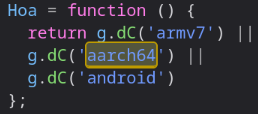1.17K
Hector Martin (@marcan@treehouse.systems)
social.treehouse.systemsAttached: 2 images
Today I learned that YouTube is deliberately crippling Firefox on Asahi Linux. It will give you lowered video resolutions. If you just replace "aarch64" with "x86_64" in the UA, suddenly you get 4K and everything.
They literally have a test for "is ARM", and if so, they consider your system has garbage performance and cripple the available formats/codecs. I checked the code.
Logic: Quality 1080 by default. If your machine has 2 or fewer cores, quality 480. If anything ARM, quality 240. Yes, Google thinks all ARM machines are 5 times worse than Intel machines, even if you have 20 cores or something.
Why does this not affect Chromium? **Because chromium on aarch64 pretends to be x86_64**
`Mozilla/5.0 (X11; Linux x86_64) AppleWebKit/537.36 (KHTML, like Gecko) Chrome/120.0.0.0 Safari/537.36`
🤦♂️🤦♂️🤦♂️🤦♂️🤦♂️
Welp, guess I'm shipping a user agent override for Firefox on Fedora to pretend to be x86.
**EDIT**: The plot thickens. Pretending to be ChromeOS aarch64 *still gets 4K*. Specifically: `Mozilla/5.0 (X11; CrOS aarch64 10452.96.0) AppleWebKit/537.36 (KHTML, like Gecko) Chrome/66.0.3359.181 Safari/537.36` still works.



Nobody is defending the practice, they’re just differentiating it from what we’ve previously referred to as “net neutrality,” which is 100% entirely about how ISPs process internet traffic, and not about the services being used within that traffic.
Unless I missed the memo, and “net neutrality” means something different now.
Since Google is both the service provider for the client browser and also provides last-mile internet services; they would fit the definition of a supposed neutral ISP but also neutral for applications and services further up the OSI stack.
Net neutrality is not just a service provider concept but has been viewed this way in the cases service providers have tried to game the system. It also encompasses the concept of an open internet; the neutrality of data is data and presentation, or lack of to the client is defined by open standards, not the desires of any one party.